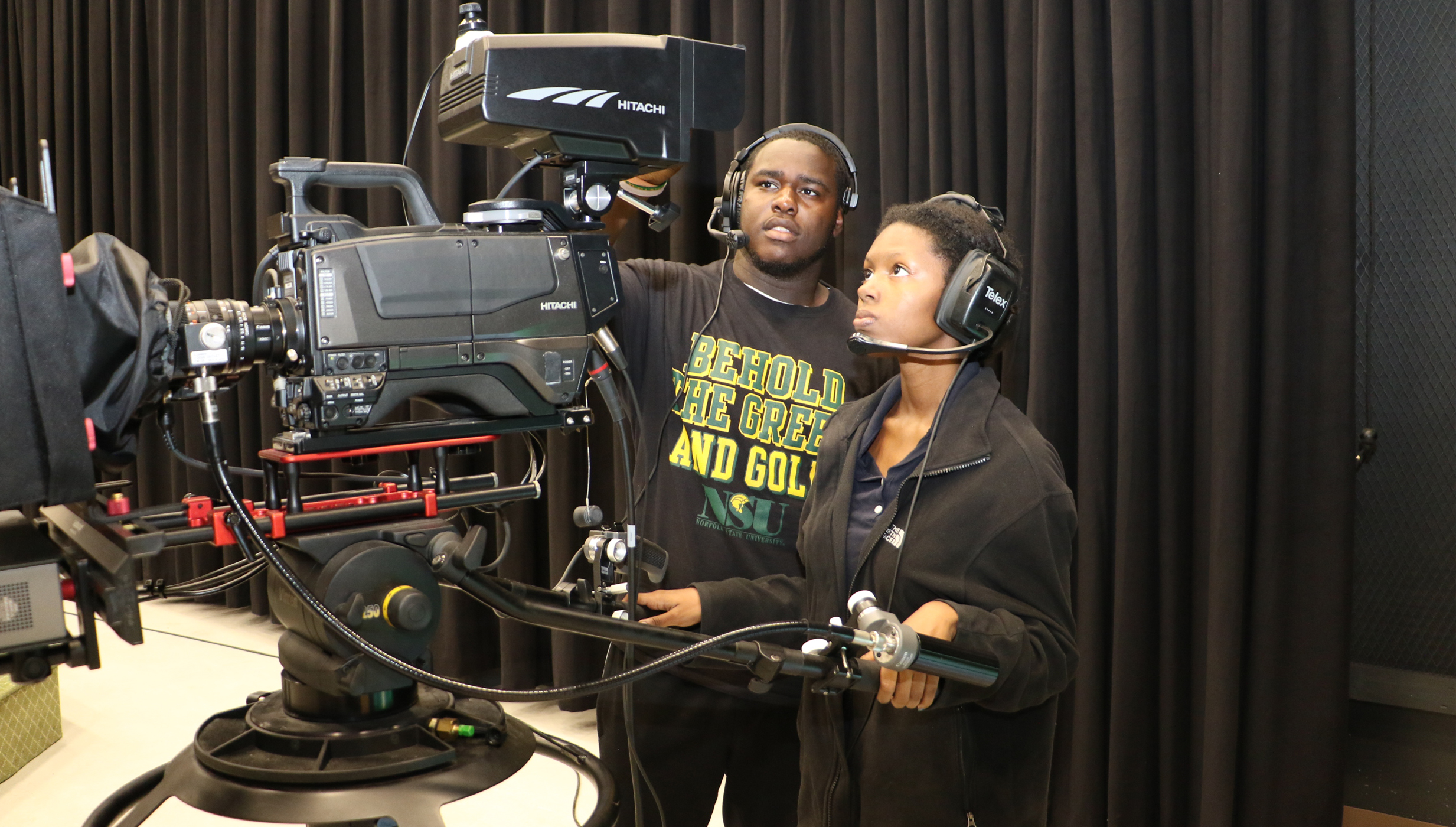We See Your Achievements in Mass Communications
Develop in-demand skills for a career with endless possibilities with a degree in Mass Communications.

Bachelor of Science in Mass Communications
Get started in an exciting career with a Bachelor of Science in Mass Communications from Norfolk State University. You’ll learn about the power of mass communications and the influence that media have on society while developing the storytelling, writing and video skills that will make you highly marketable.
As an NSU Mass Communications degree student, you’ll have access to media facilities for hands-on learning and work alongside faculty mentors and peers for a diverse and inclusive educational experience. Throughout the program, you’ll balance foundational communication theories with emerging trends, so you’re not only prepared for a career — you’ll be ready to lead.
Specialize in journalism or general broadcast
Focus on the skills that align with your career goals by choosing our General Broadcast or Journalism concentration. Both start with the same foundation in media. The Journalism concentration will develop your writing skills while General Broadcast strengthens your skills in electronic media like TV, radio and podcasts.
B.S. Mass Communications Degree at a Glance
- Average Class Size: 20
- Formats Offered: In Person
- Total Credit Hours: 120
View Mass Communications plans of study | Request more information | Apply now
Why Major in Mass Communications at NSU?
We have been preparing communicators for more than 50 years. Our rich history and years of experience have allowed us to build resources to support and enhance your Mass Communications degree education. Our faculty mentors bring their professional experience to the classroom and ensure students have access to the latest technology and emerging media to stay on the cutting edge of the field. You’ll combine your classroom learning with participation in student organizations, hands-on projects and access to an extensive alumni network to stand out in a competitive field.
Make connections
Join the student chapter of the National Association of Black Journalists, participate in MCJR Week, contribute to the Spartan Echo newspaper and television channel or hone your skills at NSU’s “Hot 91” WNSB radio station. Deepen relationships, gain valuable experience, network with peers and connect with scholarship and internship opportunities.
Get hands-on experience in your field
When you major in Mass Communications, you’ll have an abundance of opportunities to develop your skills and utilize professional tools to prepare for a career in media and journalism. In addition to classroom projects and student organizations, you’ll complete an internship that will help you determine what career opportunities you want to pursue after graduation while further developing your skills and professional network.
Access first-class facilities
Our new on-campus television studio, WNSU–CCTV47, and updated 17,000-watt radio station, WNSB Hot 91.1 FM , feature the same advanced technology used in professional studios, including high-definition video production switchers, audio mixers, studio cameras and a crane camera. Students gain knowledge of TV and radio production and directing and experience a live studio program.
What Courses Will I Take for My Major in Mass Communications?
As a Mass Communications degree student, you will study foundational media topics like law and ethics, impact on society and media history. You’ll also build your skills with courses related to your concentration — media writing, TV production, interviewing, photography and more. Round out your degree in Mass Communications with electives that align with your personal and professional interests, such as:
- Podcasting
- Media Management
- Media Sales
View the full program curriculum in the academic catalog .
Where Will My Degree in Mass Communications Take Me?
Our major in Mass Communications provides a solid foundation that can be applied to a career in media, government, academia, marketing or nonprofit work. Your communication, media and storytelling skills will equip you for a successful career in whichever job you choose.
Our Mass Communications degree graduates are employed in a variety of jobs in media and communications, including:
- Public relations specialist
- Social media manager
- Journalist
- News anchor
- News reporter
- Television and radio producer
Career outlook for a major in Mass Communications
Jobs in media and communications are growing at a faster rate than other industries, according to the U.S. Bureau of Labor Statistics. You can expect an average annual salary over $50,000, though it may vary depending on your specific job within the mass communications field.
How Do I Get Started in the Mass Communications Degree at NSU?
Take the first step toward your degree in Mass Communications by creating an NSU portal account and submitting your online undergraduate application. The portal guides you step-by-step through the process and provides a list of supplemental items you need, like transcripts and test scores. Our Office of Admissions is available to help you through this process and answer your questions.
We understand that financing their education is a top concern for most NSU students. Our Financial Aid office can address your concerns and provide information on financing options like scholarships, grants and work-study opportunities.
Degree Programs Related to Mass Communications
Accreditation for the Mass Communications Degree Program at NSU
Our Bachelor of Science in Mass Communications meets the standards of the Accrediting Council on Education in Journalism and Mass Communications (ACEJMC), which provides an assurance of quality to students, parents and the public.
Norfolk State University is accredited by the Southern Association of Colleges and Schools Commission on Colleges (SACSCOC) to award associate, baccalaureate, masters, and doctorate degrees. Norfolk State University also may offer credentials such as certificates and diplomas at approved degree levels. Questions about the accreditation of Norfolk State University may be directed in writing to the Southern Association of Colleges and Schools Commission on Colleges at 1866 Southern Lane, Decatur, GA 30033-4097, by calling (404) 679-4500, or by using information available on SACSCOC’s website (www.sacscoc.org).